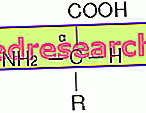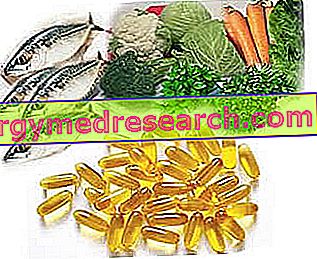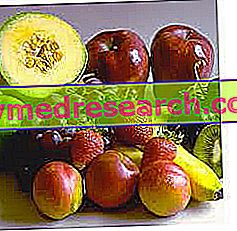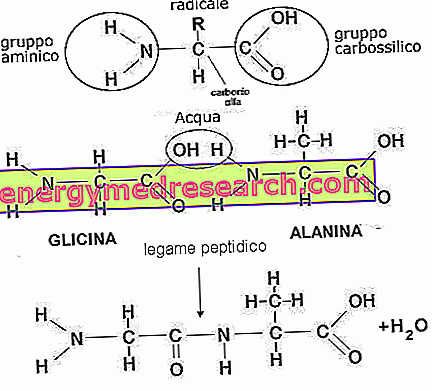(by Roberto Eusebio, absolute national champion of body fitness) I state that: it often happens to me that athletes ask me the usual and common question: "how many proteins do you take during the day and how do you take them ?? ..." In this article I would like to clarify the necessary protein intake of an individual who trains with weights according to the goals he wants to achieve
Category nutrition
Generality Vitamins (name deriving from "amines of life") are: a heterogeneous group of organic substances, indispensable in small quantities for growth and for a correct regulation of the vital activities of the organism . Vitamins are REGULATORS, they participate in an ESSENTIAL way to the metabolism and some constitute the key structure of the coenzymes
Generality The term vitamins derives from the word "amines of life", by virtue of the metabolic importance that these molecules have for the body. There are eight B vitamins and they represent most of the water-soluble vitamins that, including ascorbic acid (vitamin C), are in total nine. They are B vitamins: Vitamin B1 Vitamin B2 Vitamin B3 or PP Vitamin B5 Vitamin B6 Vitamin B8 or H Vitamin Bc or folate Vitamin B12 The B group vitamins perform many functions, all different and essential for the human body; their intake with the diet should be constantly adequate and, despite the fac
Generality Vitamins or "amines of life" are a heterogeneous set of organic substances (ESSENTIAL in small quantities) that do NOT supply energy and act with specific functions for: The development of the organism Proper BIOregulation of metabolic activities The constitution of enzymes and coenzymes
Vitamins Vitamins are essential molecules for life; these are micronutrients to be taken in very small quantities, especially when compared to energy macronutrients; the proportion of vitamins to be introduced daily with the diet, although specific and variable, varies between micrograms (µg) and milligrams (mg).
Functions in the body ORGANIC sulfur (and NOT sulphates or sulphites) is an essential component of the human organism; it is a plastic microelement, present in the chemical structure of sulfur amino acids and other useful structural molecules, such as vitamins, enzymes and hormones. Overall, around 140g of sulfur is contained in the body of an adult, distributed between: Methionine - Sulfur amino acids Glutathione - Vitamins, enzymes, hormones etc
Edited by Antonio Rubbino There is no minimum need for carbohydrates, since there are no glycidic deficiency disorders (1). The body continuously synthesizes glucose through a process called "gluconeogenesis" or GNG. Through this metabolic pathway, the body is able to synthesize glucose from other sources (lactate, glycerol and glucogenic amino acids such as leucine, isoleucine, valine, glutamine and arginine)
What are amino acids? Chemical Structure Amino acids (or amino acids) are the primary structural unit of proteins. We can therefore imagine the amino acids as bricks that, united by a glue called peptide bond, form a long sequence that gives rise to a protein. Within the stomach and duodenum these bonds are broken and the individual amino acids reach up to the small intestine where they are absorbed as such and used by the body
The following is the content (mg / 100 grams of edible product) in branched amino acids (BCAA) of some of the most common animal and vegetable foods FOOD (100 grams) PROTEIN (g) VALINA (mg) ISOLEUCINA (mg) LEUCINA (mg) Rusks 11.3 540 427 830 Bread type 00 8.6 375 337 621 Semolina pasta 10.9 544 455 834 Dried chickpeas 20
Generality The branched chain amino acids (English acronym BCAA) are a group of three essential amino acids, respectively called L-Leucine, L-Isoleucine and L-Valine. In recent years, branched-chain amino acids have conquered the world of nutritional supplementation, particularly that of sports dietetics
Exogenous antioxidants, including VIT A, C, E, selenium, carotenoids, lycopene, coenzyme Q-10 and lipoic acid are present in most foods of plant origin. Particularly in black or very dark fruits such as wild berries, where these antioxidants are contained in larger quantities. Boston University and the US Department of Agriculture conducted a series of studies to establish the antioxidant power of various foods









